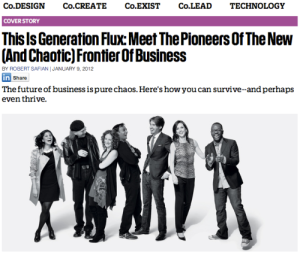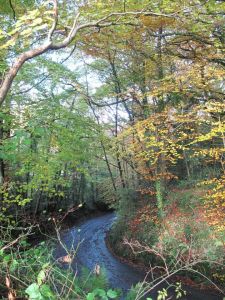Pioneers at the frontiers of business
Robert Safian, Editor of Fast Company, calls the new generation of entrepreneurs who thrive in these volatile times ‘Generation Flux’.
Anyone of any age can be Generation Flux, it is a mindset rather than an age-based demographic. For instance Wes Anderson, CEO of Box, exemplifies Generation Flux when he says:
‘The three-month road map is about the best horizon you can think about coherently’
In summary, the main characteristics of Generation Flux:
- Chaos seen as an opportunity rather than a challenge
- Embracing adaptability and flexibility
- Openness to learning from anywhere
- Decisiveness tempered by the knowledge that business life today can shift radically every three months
- No single model of leadership
- Doesn’t wait but reinvents
- Little fear of failure
There are of course challenges too:
- Free flowing information requires openness and trust
- Developing a ‘shared consciousness’
- Decision making at all levels, not just senior management
- Maintaining hierarchies while encouraging creativity and agility
- Finding time for reflection
As explored by Fast Company in the article on how brilliantly managed chaos sparks success inside organizations like Nike, Box, Cisco, Foursquare, Intuit, in these volatile times where chaos is the norm, prevalent approaches to business are just no longer good enough.
‘We have grown up with certain assumptions about what works in an enterprise, what the metrics for success are, how we organize and deploy resources. The bulk of those assumptions are wrong now. The world in which we were raised and trained no longer exists. The clarity of words we use to discuss business, standbys like marketplace and competitive advantage, are being redefined and rendered almost meaningless.’
Previously accepted business models for success are proving vulnerable, and pressure is building on giants like GE and Nokia, as their historic advantages of scale and efficiency run up against the benefits of agility and quick course corrections.
BCI: Biomimicry for Creative Innovation has been exploring new ways of operating and the radical redesign for resilience in business for some time now. A member of this collaborative, Simon Robinson, editor of Transition Consciousness (a leading business thought leadership hub based out of Brazil), has been exploring the new generation of leaders fit for the volatile climes ahead. Robinson points to the following model of complexity which explores the relationship of chaos, order, and emergence in complex systems:
This model comes from Dee Hock, the founder of VISA who created the VISA organization based on the principles of natural systems. Robinson asks:
‘Can we pivot out of the current path of following old ways of thinking into one of true leadership which is comfortable with chaos?’
For all its pioneering, Generation Flax needs to develop further to aid resilient leadership of the future. As Robinson has explored recently in his article The Blind Spot of Generation Flux, these pioneering leaders of the future need to be inspired by (and connected to) nature – nature not as chaotic but as myriad dynamic living systems where there is chaos, complexity and order all happening at the same time/space. Robinson provides examples of such leaders in Brazil such as Pedro Passo, founder of Natura who has an authentic comprehension of natural systems; and Lindolfo Martin, President of Multicoisas who understands the role intuition plays in our business and social lives – harmonizing ‘left brain’ mechanistic approaches with ‘right brain’ relational understanding.
Living systems operate on the edge of chaos; living systems are creative, emergent space/time moments that intersect order and chaos. If Generation Flux pioneer leaders fail to appreciate this understanding of natural living systems, they fail to appreciate this interplay between order and chaos.
We cannot just thrive in chaos. Yes times are becoming more volatile and unpredictable in business and beyond, yet if we learn to operate in extremely chaotic systems without understanding and building an order within the chaos, then all that will happen is that the chaotic systems end in collapse after a short burst of activity – not very sustainable or healthy. For us to encourage and embrace working environments, organizations and business ecosystems that not only adapt but thrive over the years ahead, then we need to apply living systems ‘being’ and ‘thinking’ to how we lead, like Pedro Passo of Natura, who is inspired by and connected to how nature thrives in complexity, like Ricardo Semler of Semco (who along with Dee Hock I explore in ‘The Nature of Business’).
Business leaders of the future are not just open and adaptive, but also inspired by and connected to nature; ‘thinking’ and ‘being’ in a way in which the left-brain, mechanistic leaders of old are not; guided by the way life works to ensure their businesses do not just ‘sustain’ but ‘thrive’.
To explore ‘business inspired by nature’ further, join the Face Book community here



Trackbacks